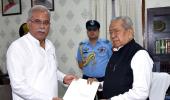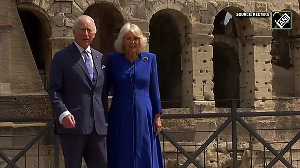The Enforcement Directorate on Monday raided the premises of former Chhattisgarh chief minister and senior Congress leader Bhupesh Baghel as part of a money laundering investigation against his son in the alleged liquor scam case and seized about Rs 30 lakh apart from some documents, official sources said.

The agency searched 14 locations in Durg district, including the Bhilai premises of Bhupesh Baghel's son Chaitanya Baghel, his alleged close associate Laxmi Narayan Bansal alias Pappu Bansal and others under the provisions of the Prevention of Money Laundering Act (PMLA).
The raids began around 7 am and the ED search party was accompanied by a security team of the CRPF, the sources said.
Chaitanya Baghel shares the Bhilai accommodation with his father and hence the premises are being covered. He (Chaitanya Baghel) is suspected to be the 'recipient' of the proceeds of crime of the liquor scam, they said.
About Rs 30 lakh in cash was seized before the eight-hour-long search ended in the evening, the sources said, adding the ED also brought a cash counting machine the former chief minister's residence.
The senior Baghel later told reporters that the ED officials 'took with them about Rs 33 lakh in cash but no gold or jewellery was seized'.
The former chief minister said he asked the ED officials about the ECIR (Enforcement Case Information Report, the ED's equivalent of a police FIR) number of the case but they said 'there was no ECIR number'.
"Then what is the investigation about? This makes it clear that asking questions in the legislative assembly is criminal now. Kawasi Lakhma (Congress MLA) asked questions and he was arrested (by the ED earlier)...," Bhupesh Baghel said.
A total of 14 premises in the Durg district were raided, official sources said.
The Congress said the raids against the Baghels were a 'conspiracy' to 'manage headlines' on a day when Parliament's Budget session reconvened and the government faced questions from the opposition on multiple issues.
Soon after the searches, a number of Congress leaders and workers gathered outside Baghel's house in Bhilai.
They staged a protest outside the House against the ED and claimed it to be a conspiracy by the Centre.
ED officials said their vehicles were stopped by Congress supporters who had gathered outside the residence of the Baghel's and a stone hit the windshield of a car while the teams were leaving.
The agency is mulling to file a police FIR in this incident, the sources said.
The Enforcement Directorate (ED) earlier said the Chhattisgarh liquor 'scam' resulted in 'massive loss' to the state exchequer and filled the pockets of the beneficiaries of a liquor syndicate with more than Rs 2,100 crore of proceeds of crime.
The ED had arrested former minister and Congress leader Kawasi Lakhma in this case in January apart from Anwar Dhebar, the elder brother of Raipur Mayor and Congress leader Aijaz Dhebar, former IAS officer Anil Tuteja, Indian Telecom Service (ITS) officer Arunpati Tripathi and some others as part of this investigation.
The alleged liquor scam in the central Indian state, as per the ED, was orchestrated between 2019 and 2022 when Chhattisgarh was ruled by a Congress government led by CM Baghel.
Assets worth about Rs 205 crore of various accused have been attached by the agency as part of this investigation till now.
The Supreme Court last year quashed the ED's first ECIR (FIR) in this case that was based on an Income Tax Department complaint.
The ED later filed a fresh case after it asked the Chhattisgarh EOW/ACB to file a fresh FIR against the accused on the basis of material shared by the anti-money laundering agency.
The EOW/ACB registered the FIR on January 17 last year, about a month after the BJP defeated the incumbent Congress government in the assembly polls, and named 70 individuals and companies, including former excise minister Kawasi Lakhma, former chief secretary Vivek Dhand and others.
According to the ED, the alleged commission generated through illegal sale of liquor was shared 'as per the directions from the highest political executives of the state'.











 © 2025
© 2025